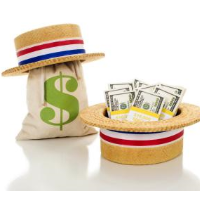Once Above Politics, State Supreme Court Seats Now the Target of Big-Money Political Campaigns
 (photo: Getty Images)
(photo: Getty Images)
By Gene Johnson, Associated Press
SEATTLE (AP) — Wealthy powerbrokers. Special interest groups. Millions of dollars pouring in to elect conservatives or liberals.
It sounds like a typical election-year contest for Congress or a state legislature, but it's actually a high-stakes battle for institutions that were once considered above politics: state supreme courts. Political groups view control of the high courts as essential to either defending or thwarting state laws. And they are more and more willing to spend big to gain the advantage.
So far in the current election cycle, a record $14 million in independent money has been spent on television advertisements for state supreme court seats, according to the Brennan Center for Justice at New York University Law School. That represents about half of all the money spent on the races, including the amount spent by the candidates themselves.
The final tally, which will not be known until after Election Day, is sure to be much higher and will probably shatter the previous outside spending record of $13.5 million, set in the 2011-12 election cycle.
"State supreme court elections have become increasingly high-cost and politicized," said Alicia Bannon, senior counsel at the Brennan Center. "Special interests have been putting a lot of money into those races, trying to shape who sits on the courts and ultimately the decisions the courts are making."
Not including uncontested races, some 52 seats in 27 states are in play Nov. 8, according to the Brennan Center's tally.
The U.S. Supreme Court's 2010 decision in the Citizens United case helped accelerate outside spending on judicial campaigns, the type of spending that is not supposed to be done in coordination with the candidates themselves.
In Washington state, the supreme court contest involves some of the world's wealthiest people. Microsoft founders Bill Gates and Paul Allen and the company's former chief executive, Steve Ballmer, have given hundreds of thousands of dollars to unseat Justice Charles Wiggins, who is seeking his second six-year term.
Wiggins became a target after he joined the majority in striking down a state law that allowed public funding of charter schools and an anti-tax measure that had been approved by voters. His opponents have contributed $900,000 just since mid-October, 60 percent of that coming from Gates, Ballmer and Allen's company, Vulcan Inc.
A political action committee called Judicial Integrity Washington has aired advertisements in the last two weeks attacking Wiggins as soft on crime. That PAC is backed by $350,000 from three other wealthy Washington executives — investor Ken Fisher, developer Kemper Freeman and Seattle Mariners Chief Executive John Stanton.
"I expected there might be some independent spending, but I didn't expect it to be of that magnitude," Wiggins said.
The Republican State Leadership Committee is dedicating $4 million to try to elect conservative jurists in many states. Group President Matt Walter said the goal is to counter years of judicial campaign spending by trial lawyers and unions.
"We saw a need to provide a balanced flow of information to the voters," he said.
North Carolina is among the states where outside groups are spending to support both sides.
A liberal political action committee called North Carolina Families First has spent more than $905,000 to try to flip control of the officially nonpartisan high court in favor of Democrats, according to ad buys tracked by the Brennan Center. In the past two years, the court's Republican majority has upheld the use of taxpayer money for student scholarships at private schools, as well as the redrawing of congressional and legislative districts in a manner that federal appeals courts later struck down as racial gerrymandering.
President Barack Obama weighed in last week with an unusual endorsement for Superior Court Judge Mike Morgan, who is trying to unseat two-term incumbent Justice Bob Edmunds.
In Kansas, conservatives hope to oust four justices who face retention elections just as the court considers cases related to abortion and education funding.
Charter school supporters as well as oil and gas companies are trying to influence the election for an open seat on the Louisiana Supreme Court, setting a record for outside spending on a judicial race in that state. Outside groups are also expected to help set a spending record in a Montana race.
Some of the spending is being used to paint justices as soft on crime even when other issues — such as school funding — seem to be more significant drivers in the race.
That sort of advertising is problematic in judicial races because it can affect how courts make decisions, said Joanna Shepherd, who teaches law at Emory University School of Law in Atlanta.
Her research has shown that as more ads air during judicial campaigns, the less likely state justices are to side with defendants during criminal appeals. That could be because sitting justices are worried about being attacked for those decisions during their next race.
"It raises real questions about due process," Shepherd said, "and how people are being treated."
Associated Press writers John Hanna in Topeka, Kansas; Kevin McGill in New Orleans; Gary Robertson in Raleigh, North Carolina; and Andrew Welsh-Huggins in Columbus, Ohio, contributed to this report.
To Learn More:
More Evidence that TV Ads in Judicial Elections Lead to Less Sympathy for Defendants back in the Courtroom (by Noel Brinkerhoff, AllGov)
Increased Spending on Judicial Elections Leads to Increase in Guilty Verdicts (by Matt Bewig, AllGov)
- Top Stories
- Unusual News
- Where is the Money Going?
- Controversies
- U.S. and the World
- Appointments and Resignations
- Latest News
- Trump Orders ICE and Border Patrol to Kill More Protestors
- Trump Renames National Football League National Trump League
- Trump to Stop Deportations If…
- Trump Denounces World Series
- What If China Invaded the United States?






Comments